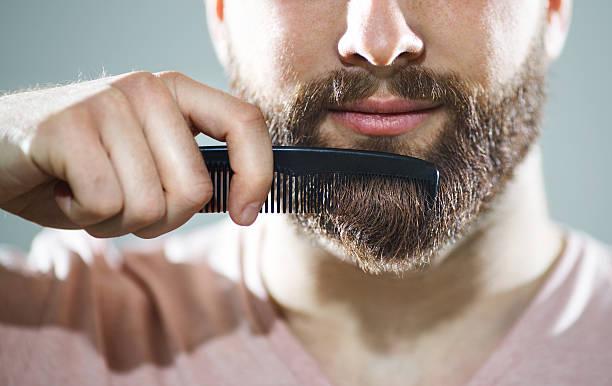To have a beautiful beard, you need to take good care of your skin. You can make your own beard care products with essential oils, vegetable oils, waxes and butters.
For the beard, we recommend E.O.s that purify, heal and stimulate. So which essential oils should you choose, and how should you use them?
A number of essential oils will help you maintain your beard on a daily basis, whether to nourish, moisturize, purify or stimulate growth.

Add shine with tea tree oil
Tea tree essential oil has purifying and antibacterial properties, making it suitable for oily skin and combating skin imperfections. Finally, it adds shine to your beard.
→ It can irritate the skin, and should therefore be diluted with a vegetable oil when applied to the skin, and should not be consumed in the case of cortisone-based treatment.
Caution also in cases of epilepsy (follow dosage instructions).
Cedar oil for beard dandruff
Used for its anti-dandruff and antiseptic properties, it reduces skin redness and promotes healing. Its woody fragrance is particularly appreciated in beard care.
→ It can also cause skin irritation, is neurotoxic and should not be used in cases of hormone-dependent pathology or mastosis.
It must not be ingested.
What are the essential oils for growing beards?
Black pepper oil
- Known for its aphrodisiac properties, it is also known for its toning action, which promotes beard growth. Black pepper essential oil is also appreciated for its spicy fragrance and warm sensation on the skin.
- It is irritating and dermocaustic, and must therefore be added to a vegetable oil to be applied to the skin. It should not be used in cases of hormone-dependent problems and mastosis.
- It must not be ingested. In addition, this oil contains allergens and, like any other essential oil, must be tested on a restricted area 24 hours before use.
Peppermint essential oil
Peppermint essential oil stimulates the hair bulbs, promoting beard growth.
- It provides a refreshing sensation on the skin, soothes blade burn and leaves a pleasant minty scent on your skin.
- This oil is likely to irritate the skin and should be diluted with a vegetable oil if applied by the cutaneous route.
- It should not be used in cases of gall-bladder disease, hypertension, cardiovascular disorders or hormone-dependent illnesses.
St Thomas bay oil
Bay St Thomas essential oil stimulates microcirculation and promotes hair growth, making it your ally if you want a longer beard.
- It also reduces the appearance of dandruff (in both hair and beard).
- It is dermocaustic and must therefore be mixed with a vegetable oil for cutaneous application.
- It should not be used for prolonged periods, and should be avoided by the elderly, epileptics and in cases of hormone-dependent disease or mastosis.
What's the best way to care for your beard?
Whether long or short, when you choose to wear a beard, it's essential to take care of it regularly.
Before applying any care products, there are a few essential steps to take for a beautiful beard:
Wash your beard to remove all impurities
Just like hair, beards need to be washed from time to time to stay clean. It's often said to be a nest of germs, and that's not entirely untrue.
Between food residues and finger-twiddling, your beard accumulates impurities throughout the day.
If it's short, you can wash your beard once or twice a week; if it's long, go to three times a week.
Choose a mild, non-irritating shampoo.

Skin care: moisturize and nourish!
A clean, well-groomed beard is nothing if you don't take good care of your skin. If it dries out too quickly, you'll notice the appearance of flakes, a kind of dandruff we'd rather do without.
Beware of the "neglected beard" effect if you don't take care of your skin on a daily basis. To avoid this problem, use plant oils and butters to moisturize and nourish your skin.
Finally, you can sculpt your beard using your fingers or a wooden comb.
Which fatty bases should I choose for my skincare routine?
To make a beard care product with essential oils, first choose a greasy base, such as a vegetable oil or butter, for example.
If you prefer to make a liquid serum to tame your beard, use these vegetable oils in your beard care:
- Ricin vegetable oilone of the most effective ways to promote hair growth
- Jojoba vegetable oilpenetrates and balances the skin (neither dry nor oily)
- Mustard oilfortifies and coats beards while adding shine
- Avocado oilsoothes skin irritations and leaves beards silky smooth
- Coconut vegetable oilantibacterial, moisturizes and softens beards, softens skin
If you prefer to use a balm to sculpt your beard, you can add a vegetable butter or wax:
- Shea butteremollient and nourishing action, ideal for thick beards
- Beeswax: has a protective and purifying action on the skin
How to combine essential oils to care for your beard?
All these recipes can be used for beards, but also for hair, and can therefore be used by the whole family (but not recommended for pregnant or breast-feeding women, or for children under 12).
Fresh shampoo with essential oils for deep cleansing:
- 30 ml pure liquid soap
- 5 ml dJojoba oil
- 30 ml distilled water
- 6 drops ofH.E. the Tea tree
- 6 drops ofPeppermint E.O.
→ Mix all ingredients in a medium-sized pump bottle and use 1-2 times a week, depending on the size of your beard.
Work into a lather in your hands and apply to damp beard.
Rinse with cold water to tone skin and shine beard.
Melt-in-the-mouth balm with essential oils to soften and purify beards:
- 10 g beeswax
- 7 gr de shea butter
- 3 g cocoa butter
- 8 ml Coconut oil
- 4 ml Avocado oil
- 5 drops ofH.E. the Tea tree
- 3 drops ofE.O. Atlas Cedar
- 2 drops ofPeppermint E.O.
→ Gently melt the butter or wax in a bain-marie, allow to cool, then add the vegetable oils and essential.
Place in the fridge for 1 hour, then whisk the mixture and store in a glass jar.
Apply a dab of balm to your fingers, warm it between your hands and then apply to the beard with your fingertips to shape it.

Beard-boosting serum with essential oils:
- A drop ofE.O. Atlas Cedar
- A drop of Bay St Thomas E.O.
- A drop of Black Pepper E.O.
- A teaspoon ofRicin vegetable oil
- Two teaspoons ofMustard vegetable oil
→ This beard serum comes in a small glass pump bottle and is applied morning and night, for around 2 days' use.
Pour a few drops into the palm of your hand, warm the oil in your hands and apply to the beard with light, circular massaging movements.
For best results, place your bottle in the fridge. A highly effective way to wake up your skin!
What precautions should I take with essential oils?
Essential oils are powerful and must be used with care to avoid intoxication or allergic reactions. It is important to respect the dosage and not to use them for prolonged periods. Don't hesitate to take breaks between each use.
You can consult the E.H. chemotype to find out about their properties and toxic risks. If you notice any redness or itching, discontinue use. If you have any doubts about using an oil, consult a doctor.
Be careful in the following cases:
- Grossesse
- Breastfeeding
- Children and babies
- Epilepsy
- Asthme
- Hormone-dependent diseases and mastosis
- Cortisone treatment
- Hypertension
- Cardiovascular diseases
How do I choose my oils, butters and waxes?
- Essential oils: prefer essential oils that are 100% natural, pure and certified organic ("Bio" label). The "Simples" label guarantees that the aromatic plant used to extract the oil has been grown far from pollution.
- Vegetable oils: Choose pure vegetable oils: organic, virgin, first cold-pressed oils. They can be used pure on skin and hair.
- Butters: for shea butter, choose pure shea butter, which is natural. As for vegetable butters, you'll find almond, cocoa, mango and argan butters.
- Waxes: Prefer natural waxes such as yellow or white beeswax, and for an alternative to animal waxes, opt instead for vegetable waxes, such as soy, Carnauba, Candelilla, or rice waxes.
Plants are full of amazing properties for beard and skin care. But if you had to choose just two, your first choice would be Bay St Thomas essential oil and Ricin vegetable oil, both of which are perfect for a dense, full beard.
They can also be used as a hair-growth treatment.



